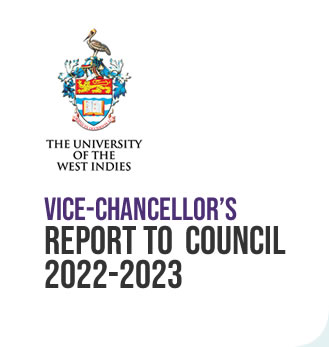CAMPUS REPORTS
Mona Campus
Jamaica

The 2023/2024 academic year at The University of the West Indies, Mona Campus, embarked on a transformative path, aiming to refocus on its core functions: research, publication, and advocacy.
Expansion of Access to Tertiary Education
The 2023/2024 academic year at The University of the West Indies, Mona Campus, embarked on a transformative path, aiming to refocus on its core functions: research, publication, and advocacy. This strategic shift aligns with the UWI 2022–2027 Triple A Strategic Plan, which aims to generate approximately US$15 million annually to sustain financial health. Achieving this financial stability is essential for allocating resources towards enhancing the teaching and learning experience for students and fostering a supportive environment for faculty, staff, and all stakeholders.
To uphold its commitment to increasing access to tertiary education, The UWI Mona initiated new recruitment strategies aimed at incoming undergraduate students for the 2024/2025 academic year. The Office of the Campus Registrar organised two open houses, intensified social media campaigns, and directly targeted accepted applicants to encourage enrolment. As a result of these concerted efforts, there was a notable increase in new undergraduate registrations for the upcoming academic year compared to the previous reporting period.
Engaging and Supporting Students
Beyond recruitment, the University took substantial steps to bolster student support and engagement. This included enhancing infrastructure, renewing the curriculum to fit student and societal needs better, and developing faculty and staff competencies. The overarching goal was to create an enriched learning environment conducive to student success.
Financial Support
Financial constraints often pose significant barriers to student engagement in their academic journeys. In the previous academic year, the university maintained its focus on building relationships with current and potential donors, facilitating smoother pathways toward graduation for students. All faculties aimed to increase opportunities for postgraduate awards and aimed to minimise tuition fees across the board.
The Office of Student Financing (OSF) launched new scholarships each year with assistance from new donors while diligently retaining existing ones. In the 2023/2024 academic year, fifteen new awards were created, five established through The University of the West Indies Development Fund (UWIDEF).
Partnerships for Scholarships
Various commercial partners on the Mona Campus also contribute to student welfare through scholarships and related programmes. For instance, National Fortress Energy (NFE) provides annual scholarships and internships to engineering students, many of whom subsequently secure employment with NFE. Moreover, the engineering plant is a practical training hub for students specialising in cryogenics and cogeneration operations.

MOU with the University of South Florida.
The Role of UWIDEF
For over three decades, the UWI Development and Endowment Fund (UWIDEF) has supported The University of the West Indies, Mona. Through strategic international partnerships, UWIDEF has significantly enhanced its ability to transform the student experience. In the fiscal year 2023, UWIDEF announced a record high of over JA$43 million in assistance to UWI Mona. These funds were allocated across multiple initiatives to reduce financial barriers for students and support essential university functions.
The 2023 support from UWIDEF included:
- JA$21 Million in Scholarships and Bursaries: Aimed at alleviating financial hurdles for students.
- JA$500,000 for Food Grants: Providing hot meals for vulnerable students to ensure food security.
- JA$1 Million for Accommodation Support: Assisting students with on-campus living expenses.
- JA$1.9 Million for Medical Equipment: Supporting the University Hospital West Indies (UHWI), which improved the training of medical sciences students.
- JA$13 Million for Community Outreach: Funding community-based outreach initiatives led by UWI medical students.
- JA$600,000 for Laptops: Supplying essential technology to students lacking digital resources.
Strengthening Learning Environment and Infrastructure
In the 2023/2024 academic year, the Mona Information Technology Services (MITS) pursued crucial goals to advance the digitalisation of university processes to enhance educational quality. The campus upgraded its virtual learning environment and learning management system, significantly improving online teaching and learning capabilities. These upgrades provided both students and lecturers with a more effective and user-friendly educational experience.
The strategic initiatives outlined for the academic year 2023/2024 reflect UWI Mona’s dedication to expanding access to higher education, increasing student engagement, and ensuring student financial support. By focusing on core functions and utilising innovative recruitment and retention strategies, the university aims to create a thriving educational environment that supports academic success while navigating the financial challenges faced by students today. The collaboration with commercial partners and support from UWIDEF exemplify the collective effort required to sustain and enrich the university experience, ultimately benefiting students and the wider community.
Operation Restructuring Transformation and Growth
The Mona Campus is engaged in a large and expansive strategic initiative for administrative reform, Operation Restructuring Transformation and Growth. This initiative aims to reform the administrative process and organisational architecture to improve operational efficiency.
The initiative’s outcome is improved staff and student satisfaction. The reform will also enhance the deliverables of the other strategic initiatives. This enabler will seek to improve several key areas, including reengineered processes and procedures, change management, and improved operations.
During the academic year 2023/2034, the consultants completed their assessment of the offices and provided a Current State report highlighting the pain points of the existing administrative design and processes. In addition, the Steering Committee embarked on several initiatives dubbed “Quick Wins Initiatives”. The strategic administrative and operational reforms undertaken during the academic year 2023/2024 will pivot the institution towards the financial health required to support and strengthen its core functions of teaching and learning, research, publication, and advocacy.

Operation Restructuring Transformation and Growth (RTG) Meeting.


